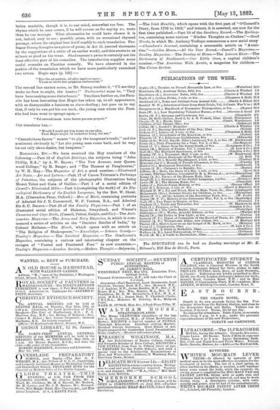The Captives. Translated from Plautus by H. A. Strong, M.A.
(G. Robertson, Melbourne.)—Professor Strong has made his trans-
lation readable, though it is, to our mind, somewhat too free. The rhyme which he uses seems, if he will excuse us for saying so, more than he can manage. What alternative be could have chosen it is not, indeed, easy to see; possibly prose, with an occasional rhymed passage, where the original lent itself readily to such translation. Pro- fessor Strong does give us a piece of prose, in Act iii. (moved thereunto by the suggestions of a critic of an earlier work), and this seems to us at least as good as his verse. Shakespeare's prose is certainly not the least effective part of his comedies. The introduction supplies some useful remarks on Plantine comedy. We have observed in the portion of the translation which we have more particularly examined two errors. Hegio says (p. 126) :-
" Ego ibo ad patrem, ad alios captives moos : Visam ne nocte hac quippiam turbaverint."
The second line cannot mean, as Mr. Strong renders it, "I'll see they make no fuss to-night, the knaves !" Turbaverint must be, " They have been making some disturbance." T wo lines further on, the Para- site has been lamenting that Hegio has taken up, to all appearance, with so disreputable a business as slave-dealing; but goes on to say that, if only he can get his son back, the young man whom the Para- site had been wont to sponge upon,-
" Vel canatificinam hum facere possum perpeti." Our translator has,—
" Would I could get him home on any plea, Then Hegio might be racked or hung, for me."
" Carnnficinam facere " means "to ply the hangman's trade," and the sentiment obviously is, " Let the young man come back, and he may be not only slave-dealer, but hangman."



































 Previous page
Previous page